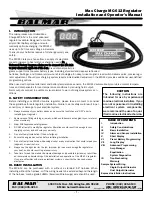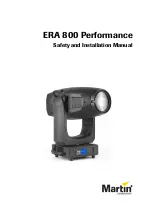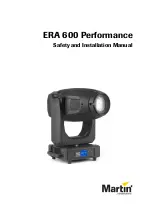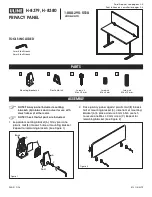
© Thermo
Scientific
, May 2003. Issue 7
25
CHAPTER 7
HYBRIDISATION GUIDE
TROUBLESHOOTING GUIDE FOR NUCLEIC ACID HYBRIDISATIONS
Our bottle system is intrinsically simpler and safer to use than other methods of
Hybridisation such as Hybridisation in bags or plastic boxes. In Hybridisation Ovens, the
temperature of the solutions is precisely controlled and regulated and, in addition, the
rotisserie device ensures that the solutions are continuously and evenly distributed over
the membrane. Thus, the optimum conditions for Hybridisation and washing are
maintained throughout when using this system. However, during the transfer of protocols
from bags to bottles some minor adjustments to the protocols may be necessary.
When loading the mesh and membranes into the bottles, air bubbles should be avoided.
Ensure that the Oven is sited on a flat surface so that the probe solution is distributed
evenly along the length of the bottles and that there is sufficient probe solution to cover
the entire membrane. On occasions the mesh and membrane can become tightly rolled
up in the bottle. This occurs if the mesh is loaded incorrectly
(see Figure 3 in Chapter 3).
Background Reduction - General
All solutions for nucleic acid Hybridisations should be prepared using distilled water and
highest quality reagents in clean glassware. In particular, water with a high organic
content will cause bad background problems. Formamide should be freshly de-ionised.
Membranes should always be handled wearing gloves or with forceps. The following
should also be taken into consideration: -
Prehybridisation Procedure
Prehybridisation is required to block the sites on the nylon membrane, which the probe
would otherwise bind to non-specifically. Failure to carry out adequate preHybridisation
results in high backgrounds. If dextran sulphate is used in the Hybridisation solution, then
it must also be included in the prehybridisation solution.
Содержание Shake 'n Stack 6244
Страница 13: ...2 4 Shake n Stack Thermo Scientific Section 2 Unpacking and Installation...
Страница 21: ...4 6 Shake n Stack Thermo Scientific Section 4 Methodology of Hybridisation...
Страница 27: ...7 2 Shake n Stack Thermo Scientific Section 7 Use of Radioactive Probes...
Страница 31: ...8 4 Shake n Stack Thermo Scientific Section 8 Technical Specifications...
Страница 32: ...Shake n Stack 8 5 Thermo Scientific Section 8 Technical Specifications...
Страница 33: ...8 6 Shake n Stack Thermo Scientific Section 8 Technical Specifications...
Страница 34: ...Shake n Stack 8 7 Thermo Scientific Section 8 Technical Specifications...
Страница 35: ...8 8 Shake n Stack Thermo Scientific Section 8 Technical Specifications...
Страница 36: ...Shake n Stack 8 9 Thermo Scientific Section 8 Technical Specifications...
Страница 37: ...8 10 Shake n Stack Thermo Scientific Section 8 Technical Specifications...
Страница 38: ...Shake n Stack 9 1 Thermo Scientific Section 9 Electrical Schematics...
Страница 39: ...9 2 Shake n Stack Thermo Scientific Section 9 Electrical Schematics...
Страница 40: ...Shake n Stack 9 3 Thermo Scientific Section 9 Electrical Schematics...
Страница 41: ...9 4 Shake n Stack Thermo Scientific Section 9 Electrical Schematics...
Страница 42: ......
Страница 50: ...A 8 Shake n Stack Thermo Scientific...
Страница 51: ...HYBRIDISATION GUIDE USER INSTRUCTION MANUAL Manual 7222060 Rev 0...
Страница 91: ......















































